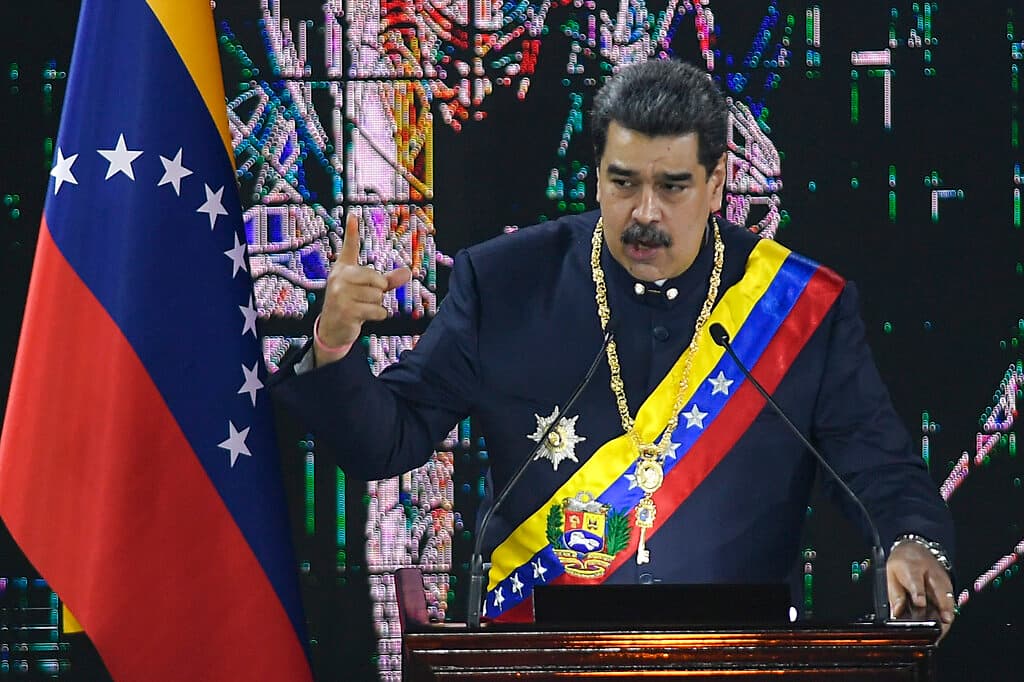Snubbed by OPEC, Biden Floats Easing Venezuela Sanctions in Search for New Oil Supplies
The prospect of lifting sanctions prompted howls of protest from Republicans in Congress and Venezuelan exiles who fled a regime accused of widespread human rights abuses.

After failing to convince OPEC to increase oil production, officials in the Biden administration are looking elsewhere to secure new supplies and their gaze is reportedly landing on the socialist government in Venezuela.
The Wall Street Journal is reporting that the administration is considering lifting some of the economic sanctions on the government of President Nicolás Maduro and allowing Chevron to begin pumping Venezuela’s crude again in exchange for resumed talks with opposition leaders in the country aimed at holding free and fair elections in 2024.
The White House, via a National Security Council spokeswoman, Adrienne Watson, initially denied the report, saying in a statement that the sanctions policy in place since 2019 remains unchanged. In an appearance on CNBC Thursday morning, however, the White House’s energy advisor, Amos Hochstein, was less adamant.
“We’re still looking at what the Maduro regime needs to do in order for us to take steps on our end,” Mr. Hochstein said. “We have already taken some steps that make sense to strengthen the U.S. position economically, as well as our objectives for transformation and change in Venezuela, and we’re going to continue working on that. But we’re not there yet.”
The report came on the same day that the 23-member OPEC+ cartel announced plans to cut back production in an effort to goose oil prices on international markets. The Biden administration had lobbied members of the group, which includes Russia and Venezuela, to increase production instead in an effort to tamp down gasoline prices that have been creeping back up again ahead of the midterm elections.
Asked Thursday by reporters outside the White House whether Venezuela was a viable alternative to the OPEC oil, Mr. Biden said it was one of “a lot of alternatives” but that “we haven’t made up our mind yet.” The Maduro regime, he said, would have to do “a lot” in order for his administration to consider lifting sanctions.
The report prompted howls of protest from Republicans in Congress and Venezuelan exiles who fled a regime accused of widespread human rights abuses and mismanagement of what was once one of the world’s largest oil industries. South Dakota’s Senator Thune said easing the sanctions would only worsen the country’s dependence on foreign oil supplies and make Americans further beholden to tyrants around the world.
“This administration, when they took office, started an attack on American energy production. We were at a point when we were energy independent. We were exporting energy. We’ve now become dependent on OPEC and other countries,” Mr. Thune said in an appearance on Fox News Thursday morning. “They will sacrifice our economic security, our energy security, our national security, to get a political win in November.
“Why can’t they give licenses to companies in this country so we can start producing American energy?” he added.
Even some Democrats chimed in with their opposition to the move. Congresswoman Val Demmings, who is running against Senator Rubio for Senate in Florida — a state with one of the largest concentrations of Venezuelan exiles in the country — said the sanctions should stay.
“As someone who served as a hostage negotiator for 12 years, I learned that there are just some people you do not make deals with because you can never trust them,” she said. “Lining the pockets of one of the world’s most corrupt, oppressive, dangerous criminals will not support the freedom of the Venezuelan people.”
American officials cautioned that a deal with the Venezuelan government is not final and could still fall apart. The negotiations hinge on Mr. Maduro’s willingness to sit down with opposition leaders and discuss conditions under which the country would hold new elections.
Talks are also said to be focused on freeing up hundreds of millions of Venezuelan dollars frozen in U.S. bank accounts so the country can buy desperately needed medicine, food and equipment for its dilapidated electrical grid and city water systems.
A deal would mean that Chevron and other American oilfield services companies would be free to begin operating there again. Venezuela sits on the world’s largest proven oil reserves — more oil than even Saudi Arabia — and was once America’s largest supplier of crude, albeit of lower quality than other sources.
Years of neglect, corruption and mismanagement of those assets have decimated the industry, however, and sent the nation’s economy into a tailspin that is forcing tens of thousands of Venezuelans to flee the country in search of asylum — many of them to the United States.

